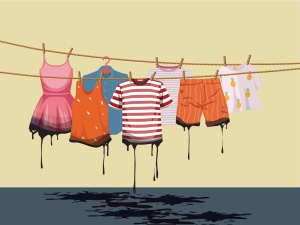Waste Framework Directive a missed opportunity for textile recycling, but a glimmer of hope for reducing clothing dumped on the Global South
- The proposal will make fashion brands responsible for the cost of end-of-life treatment of their products through introduction of Extended Producer Responsibility (EPR), but fails to introduce reuse and recycling targets
- The proposal introduces mandatory sorting of textiles before shipment abroad, aimed at stopping the deluge of EU’s fast fashion waste on the Global South
Today the European Commission published the much anticipated revision of the Waste Framework Directive (WFD), which includes new rules for dealing with textile waste. Through long awaited EPR measures, apparel brands will be made to pay for the costs of management of textile waste. The fees will be eco-modulated to encourage better design of clothes, shoes and household textiles. The proposal unfortunately omits EPR for other two significant textile waste streams: carpets and mattresses.
The proposal promotes circular textile technologies like fibre-to-fibre recycling but lacks specific reuse and recycling targets, potentially limiting its impact. Unlike the EU textiles strategy which envisioned mandatory targets for reuse and recycling, the Commission’s proposal backtracks in this crucial area. This will undermine nascent initiatives that aim to prioritise reuse and recycling over immediate downcycling or incineration, delaying the much-needed transformation towards a circular economy.
Currently, less than 1% of clothing is recycled into new garments, with a staggering 87% eventually ending up in landfills or being destroyed, perpetuating the environmental havoc caused by clothing waste. According to our recent Synthetics Anonymous 2.0 report, which included a brand survey, over two thirds of fashion brands backed ambitious reuse and recycling targets, while over 80% expressed their support for a mandatory EU-harmonised Extended Producer Responsibility (EPR) for textiles.
Urska Trunk, Campaign Manager at the Changing Markets Foundation commented: “We welcome this proposal, as it is the first time ever that the fashion brands will be forced to pay for their role in the growing waste crisis. However, the European Commission has missed the mark on textile reuse and recycling, stifling innovation in Europe and failing to put the fashion industry on a more circular trajectory.”
The European Commission’s proposal takes a much-needed step by emphasising the importance of proper sorting, which ensures that used textile and footwear items are treated as waste until they undergo professional sorting. This approach is particularly important given our recent research findings, revealing that 20- 50% of used clothing exported to Africa is waste, ending up in landfills or being burnt.
Notes to the Editor:
- The next steps for the proposal are for it to pass to the EU Parliament and EU Council for the co-decision process where amendments will be proposed.
- In February 2023, the Changing Markets Foundation launched released Trashion, an on the ground investigation which found that EU countries are dumping 37 million items of junk plastic clothing in Kenya every year that are too dirty or damaged to be reused, creating serious health and environmental problems for vulnerable communities The probe by Clean Up Kenya and Wildlight for the Changing Markets Foundation highlights fast fashion’s dependence on cheap plastic fabrics to make clothes that are not designed for repair or recycling and are increasingly seen as disposable.
[ENDS]
Contacts:
Nusa Urbancic, Changing Markets Campaigns Director,
nusa.urbancic@changingmarkets.org +447479015909
You might also like...

A New Look for the Fashion Industry: EU Textile Strategy and the Crucial Role of Extended Producer Responsibility
This report and briefing focuses on Extended Producer Responsibility (EPR), a powerful market-based policy tool that is expected to be at the centre of the upcoming Textiles Strategy.

Trashion: The stealth export of waste plastic clothes to Kenya
This report shows that the amount of second-hand clothing flowing to Kenya from global sources has grown significantly in recent years and the system of used-clothing trade is currently at breaking point.

Fossil fashion: the hidden reliance of fast fashion on fossil fuels
This report reveals the hidden reliance of the fast fashion industry on fossil fuels. It also uncovers how the oil and gas industry are betting on production of plastic as a growing share of their revenue.